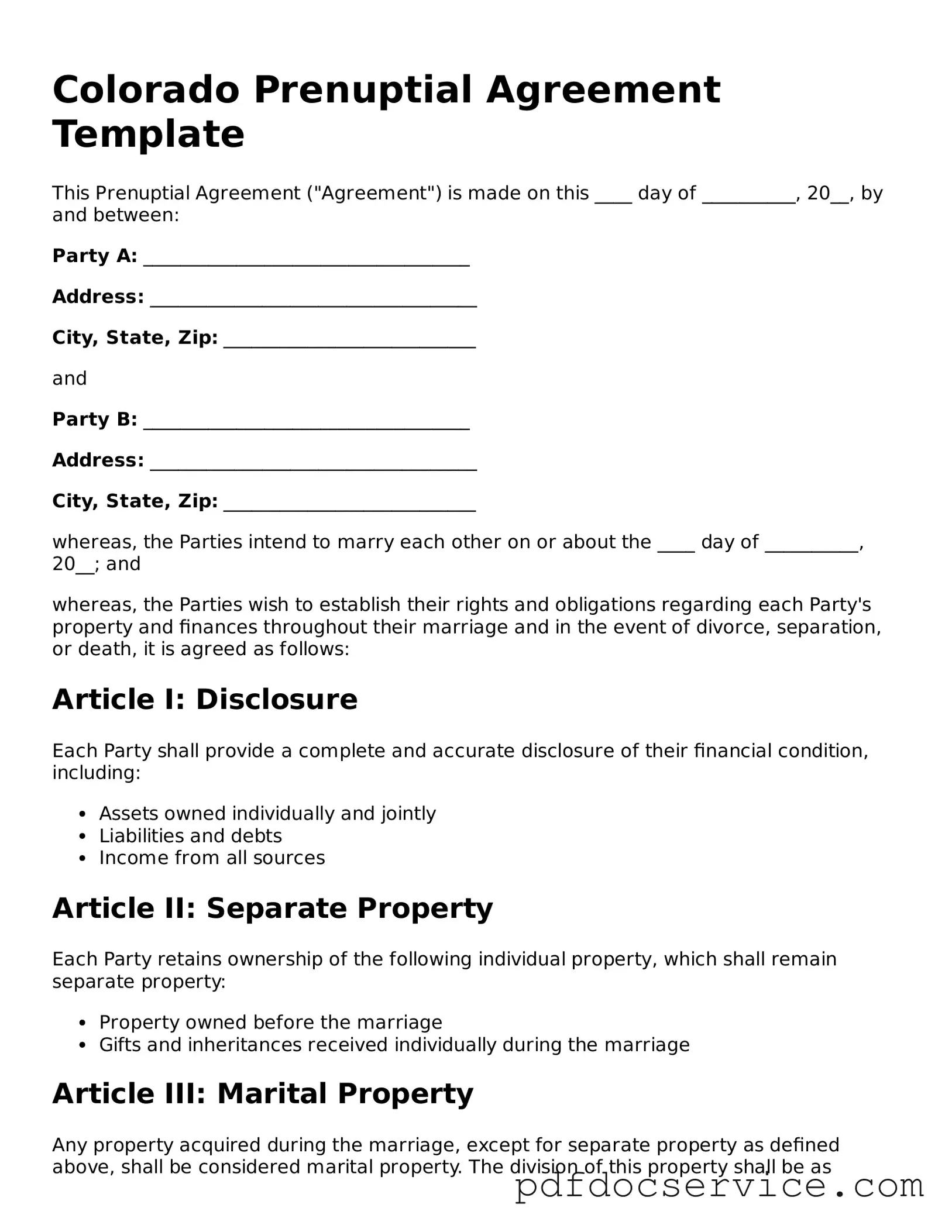What is a prenuptial agreement?
A prenuptial agreement is a legal document that couples create before getting married. It outlines how assets and debts will be handled in the event of a divorce or separation. This agreement can help clarify financial responsibilities and protect individual interests.
Why should I consider a prenuptial agreement in Colorado?
There are several reasons to consider a prenuptial agreement:
-
Protection of individual assets: It can safeguard personal property acquired before the marriage.
-
Debt management: It can specify how debts will be handled, protecting one spouse from the other's liabilities.
-
Clarity: It provides clear expectations regarding financial matters, reducing potential conflicts.
-
Custom terms: Couples can create terms that reflect their unique circumstances and preferences.
What should be included in a Colorado prenuptial agreement?
A prenuptial agreement in Colorado typically includes:
-
Identification of both parties and their assets.
-
How assets will be divided in the event of divorce.
-
Debt responsibilities and management.
-
Provisions for spousal support or alimony.
-
Any other specific agreements the couple wishes to include.
Do both parties need a lawyer for a prenuptial agreement?
While it is not legally required for both parties to have separate lawyers, it is highly recommended. Having independent legal representation ensures that both individuals fully understand their rights and the implications of the agreement. This can help prevent future disputes over the validity of the agreement.
Can a prenuptial agreement be modified after marriage?
Yes, a prenuptial agreement can be modified after marriage. Both parties must agree to the changes, and it is advisable to document any modifications in writing. This helps maintain clarity and can prevent misunderstandings later on.
How does a prenuptial agreement affect property acquired during marriage?
In Colorado, property acquired during marriage is generally considered marital property. However, a prenuptial agreement can specify how such property will be treated. Couples can agree that certain assets remain separate or outline how they will be divided in the event of divorce.
What happens if we don’t have a prenuptial agreement?
If a couple does not have a prenuptial agreement, Colorado's marital property laws will apply. This means that assets and debts acquired during the marriage will typically be divided equitably in the event of a divorce. This division may not align with the couple's personal preferences or intentions.
Is a prenuptial agreement enforceable in Colorado?
Yes, a prenuptial agreement is enforceable in Colorado as long as it meets certain legal requirements. These include being in writing, signed by both parties, and entered into voluntarily. Additionally, the agreement must be fair and not unconscionable at the time of enforcement.
How can I create a prenuptial agreement in Colorado?
Creating a prenuptial agreement involves several steps:
-
Discuss your financial situation and goals with your partner.
-
Consult with a lawyer to understand your rights and obligations.
-
Draft the agreement, ensuring it addresses all necessary topics.
-
Review the agreement together and make any necessary revisions.
-
Sign the agreement in the presence of a notary public.
When should we start discussing a prenuptial agreement?
It is best to start discussing a prenuptial agreement early in the engagement process. This allows both parties to consider their options without the pressure of an impending wedding. Open communication about finances and expectations can strengthen the relationship and ensure both partners feel secure.

